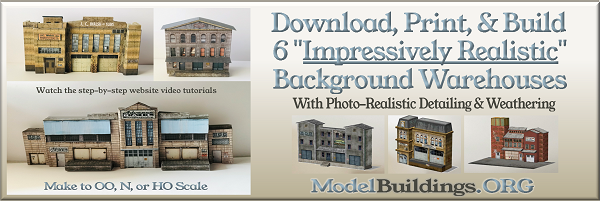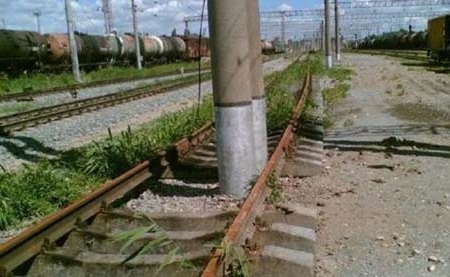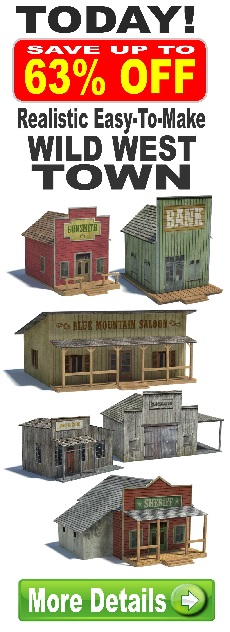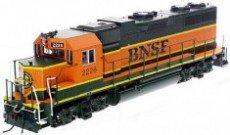Everything on model trains, model railroads, model railways, locomotives, model train layouts, scenery, wiring, DCC and more. Enjoy the world's best hobby... model railroading!
How Much Can A Loco Pull?
Don asks readers:
“The grade calculator at http://www.modelbuildings.org/free-calculator-tools.html was great thanks. What I need most is what is the most grade an HO engine should pull ( ballpark )”
Assembly Instructions
Peter asks:
“Hi. Does anybody out there know where I can purchase assembly instructions for a OO Mercian Models SG20 Bishops Castle ‘Carlisle’ 0-6-0 loco. I bought this sometime ago and have mislaid the plans. Any assistance would be much appreciated. Thanks in advance”
Ideas for Small 55 Inch x 23 Inch Layout
Matt from NSW in Australia has this question for those in the know:
“I live in an apartment (I think you call it a condo in the states) and haven’t got a lot of space for an HO layout. I want HO not N scale because I like the larger train size. Don’t fall off your chair but the surface I have to work with is only 55″ x 23″. I know that’s not a lot of room to play with and know I will need to stick to small switcher engines and the like. My preference is for continuous running with possibly a distorted oval design with possibly 10″ turns? Not really sure what will work best.
I would appreciate any ideas for types of layout and rolling stock etc.? Haven’t started yet so am open to suggestions. Thanks a million and thanks for publishing my question!”
To add an answer or comment click “COMMENTS” underneath. To ask a question click “ASK A QUESTION” underneath any posting. It’s that easy.
Locomotive Issues
John has a couple of questions for blog readers:
“I have a 4-8-8-4 loco with a 4-10 tender and the only name is made in Italy. I place this N scale loco on a flat track and it doesn’t get under way but just sits there and spins. All other locos get around with no problem.
Also, does anyone know of a repair shop for Trix locos? I consulted the repair shops from a rail mag and many of the shop are no longer in business. ”
Post you comment on the blog using the COMMENTS link under this posting.
Derailing Locomotive
Marion sent in this question:
“My husband gifted me with a wonderful BLI HO loco that won’t stay on the track. Our other locos have no problem. Others, who have the same loco, are having no problem, apparently. We have adjusted track, etc., and still have the problem. Some of the wheels are really small, but, again, others don’t seem to be having the problem. HELP!”
Fixing Dead Spots On Crossing
Dave has this question:
“Does anyone know of anything that can be done to reduce dead spots when a loco passes thru crossing slow speed. Seems like the smaller the angle, the worse the performance (i.e. a 19 degree is much worse that a 12.5 degree crossing).”
Track Grade Confusion
Don is into HO and asks:
“I used to understand grades, but not now. What is the best or most grade you can use going up hill and how many inch’s per foot for each one?”
Don here is a handy grade calculator for you http://www.modelbuildings.org/free-track-grade-calculator.html
Don, sorry your other question wasn’t published as it required more clarity and details.
Strange Locomotive Problem
Wayne posted this question to readers:
“I have several steam locos in both N and HO gauge and they run poorly forward but run MUCH BETTER backwards. Any Ideas, cause or cures? Thank you.”
Use the COMMENTS link to add or view answers.
To post a question use the ASK A QUESTION link.
Passenger Car Lighting
Dan models HO and asks readers:
“I have a Rivarossi collector passenger car non lighted and it looks like a Athearn pleasure dome passenger car. I would like to add internal lighting. Please advice . I have the lights for a Walthers pleasure dome car. I do not know the next step. Please advice thanks guys.”
Downloaded Plans Constructed and Positioned on Layout Ready for Final Detailing
Rich W kindly sent in these photos of a couple of house plans he downloaded from the modelbuildings.org website
Here’s what Rich had to say – “I mentioned I would send a few pictures. These is first shots of section before getting put on the layout. I still have some more details to do, but thought you might like to see these. Yes, I cut the windows out and used non glare tape inside the houses. Because of space I had to hang a few near the edge of cliff and so with the texture sheet I made the decking, and cut wood to make the railings. Thanks again.”
http://www.modelbuildings.org/scale-houses-8-house-models-to-make.html
DCC and DC Confusion
Gabriel posted this question for readers:
“Hi. Can DC and DCC work on the same layout by switching between the two? Can the clips for the points converting for DCC affect DC operation? I am considering also buying HO DCC equipment but to run on the same track. Thanks.”
Those Were The Days
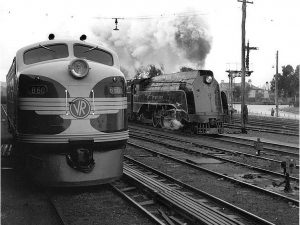 Victoria, Australia 1952. Victorian Railways new diesel electric B 60 locomotive being delivered to Melbourne passes one of the S class ‘Pacific’ steam locomotives it eventually replaced.
Victoria, Australia 1952. Victorian Railways new diesel electric B 60 locomotive being delivered to Melbourne passes one of the S class ‘Pacific’ steam locomotives it eventually replaced.
The B class were the first mainline diesel locomotives and were used for both passenger and freight services.
The design was based around the successful Electro Motive Diesel F-unit locomotives with a distinctive bulldog nose. They featured a streamlined drivers cab at each end.
